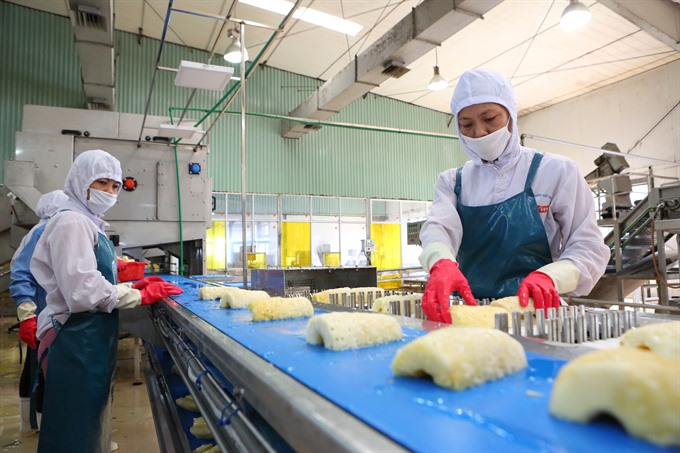 Economy
Economy

Việt Nam is likely to reach total export turnover of US$275 billion for 2017, a surge of nearly 56 per cent from last year and exceeding the set target.
 |
| Pineapple processed for export at the Đồng Giao Foodstuff Export JSC in Ninh Bình Province. — VNS Photo Trương Vị |
HÀ NỘI — Việt Nam can achieve a whopping 56 per cent annual rise in export turnover this year to reach US$275 billion, a senior official has said.
Minister and Chairman of the Government’s Office, Mai Tiến Dũng, said at a press conference on Tuesday that this achievement is possible with concerted efforts by all stakeholders including businesses, ministries and agencies.
If this target is achieved, it would far exceed the target of $188 billion set for the year. The target was later revised to $202 billion.
Dũng, who based his statement on a new report by the Ministry of Industry and Trade (MOIT), said exports had already posted an impressive 19.8 per cent year-on-year increase in the first nine months of the year.
According to the General Statistics Office (GSO), exports by the domestic sector in the first nine months touched $43.2 billion, a 16.8 per cent increase, while those of the foreign-invested sector was $110.8 billion, an increase of 21 per cent.
The United States remained the largest consumer of Vietnamese goods at $31.2 billion, followed by the EU and China at $28.4 billion and $21.9 billion, respectively.
Import turnover during the first nine months jumped 23.1 per cent year-on-year to $154.5 billion, with imports by the domestic sector touching $61.3 billion, an 18.7 per cent increase, and that of the foreign-invested sector rising 26.1 per cent to $93.2 billion.
China continued to be the largest importer of Vietnamese goods at $41.6 billion, a year-on-year surge of 15.6 per cent. The Republic of Korea (RoK) and ASEAN came second and third with $33.9 billion and $20.6 billion, respectively.
Việt Nam’s trade deficit for the periods is estimated at $500 million.
The trade deficit incurred by the domestic sector totaled $18.08 billion, and that of the foreign-invested sector was $17.64 billion.
Potentials, challenges
Experts have said that the growth potential for exports is very high, with Vietnamese goods and commodities present in nearly 200 countries and territories.
Along with the focus on exports to key markets with high purchasing power like the US, the EU, Japan, RoK, China and ASEAN, Vietnamese goods have also expanded to Africa and Latin America.
However, the country is expected to face many obstacles and challenges ahead, including competition from other countries dealing in similar commodities and goods, pressure from anti-dumping lawsuits, and other trade barriers arising out of increasing protectionism in importing countries.
Moreover, Vietnamese exports are still focused on scale and quantity rather than quality and value, the experts said.
Trần Thanh Hải, deputy director of the MOIT’s Export Department told the Thời báo Kinh tế Việt Nam (Vietnam Economic Times) newspaper that although Việt Nam had joined the global supply chain, its role remains modest.
The country’s export turnover was still heavily dependent on exports of FDI enterprises, with their contribution much higher than that of domestic firms.
Besides, Hải said, FDI firms have not supported local businesses in strengthening their presence in the global supply chain.
The under-developed supporting industry is also hindering domestic firms by forcing them to import a large quantity of components, he said.
Hải also stressed that most Vietnamese enterprises have not fully grasped and updated their knowledge of FTA provisions, and this restricts their ability to make proper business plans before exporting.
He said domestic firms need to increase their competitiveness by improving corporate governance and applying technological innovations.
In the processing and manufacturing sectors, enterprises will find it difficult to sustain their exports if they ignore development of the supporting industry, Hải said, adding this task must be accorded top priority.
He said it was very important that the localisation rate in key industries like mechanical products, electronic components and devices, textiles and footwear increases significantly in the near future. — VNS




